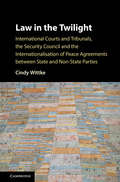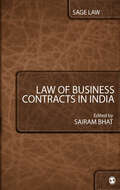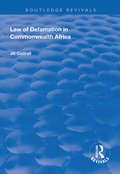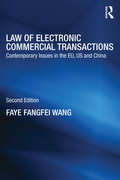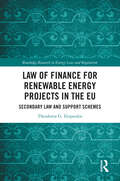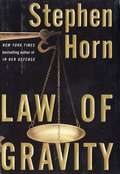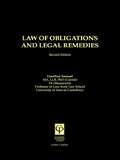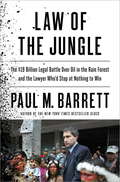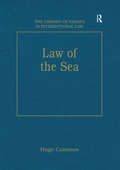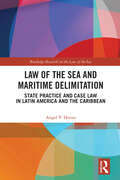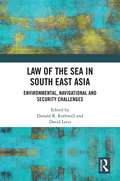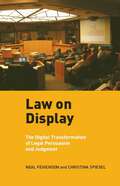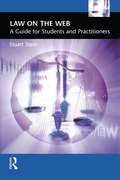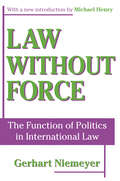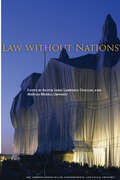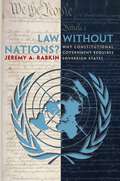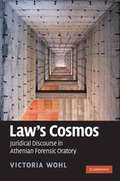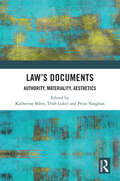- Table View
- List View
Law in the Twilight: International Courts and Tribunals, the Security Council and the Internationalisation of Peace Agreements between State and Non-State Parties
by Cindy WittkeAn informative book focusing on the internationalisation and legalisation of peace agreements to settle intra-state conflicts between state and non-state parties. Cindy Wittke focuses on two key issues: how international courts and tribunals deal with peace agreements; and what implications the United Nations Security Council's involvement in the negotiation and implementation of peace agreements has for the agreements' legal nature, the status of the non-state parties to agreements and the interpretation of peace agreements. Wittke argues that the processes of negotiating and implementing peace agreements between state and non-state parties create new spheres, spaces and forms of post-conflict law making and law enforcement. For example, contemporary peace agreements can simultaneously take the form and function of internationalised transitional constitutions and agreements governed by international law. The resulting characteristics of contemporary peace agreement lead to permanent ambiguities shaping their interpretation and enforcement.
Law of Attraction: A Novel (Anna Curtis Series #1)
by Allison LeottaAs a newly minted Assistant U.S. Attorney in Washington, D.C., Anna Curtis has already developed thick skin to deal with the brutality she encounters with her daily stack of domestic violence cases. Yet when Laprea Johnson walks into Anna’s life—battered by her boyfriend on the morning after Valentine’s Day—there’s something about this particular case that Anna can’t quite shake, something that reminds the prosecutor of her own troubled past. At the trial, Laprea makes a last-minute reversal, lying on the witness stand to free her boy-friend. Shortly after he is freed, Anna is horrified to hear that Laprea’s body has been found in a trash heap. Hastily assigned to prosecute the murder case alongside intimidating chief homicide prosecutor Jack Bailey, Anna’s heart sinks when she learns that her own boyfriend, public defender Nick Wagner, is representing the accused. Torn between bringing the killer to justice and saving her personal life, Anna makes a series of choices that jeopardizes her career, her relationships, and her very life as she uncovers the shocking truth behind the murder. Weaving expert knowledge with deft storytelling, federal sex-crimes prosecutor and Harvard Law School graduate Allison Leotta takes readers on a thrilling ride through D.C.’s criminal justice system. From the back rooms of the U.S. Attorney’s Office and the flirtations and machinations of Washington’s Ivy League lawyers to the struggles of its poorest citizens on the gritty streets of Anacostia, Law of Attraction is a gripping debut from an exciting new talent.
Law of Business Contracts in India (SAGE Law)
by Sairam BhatLaw of Business Contracts in India brings together in-depth, wide-ranging articles by legal experts in the area of Business Contracts. It focuses on the modern forms of business contracts and exposits on the historical evolution, judicial interpretation and future applications of such contracts. The articles bridge the gap between the theoretical understanding of contract law and its practical orientation, need, relevance and challenges. The key features of the volume are: • Comprehensive coverage of modern laws on contract formation. • Discussion on the relevance of international laws in the global business context. • Delineation of the modern style, practice and challenges confronting new forms of contracts. • Description of the application of contract law to special contracts. • Discourse on the issues of international taxation and multinational contractual jurisdiction. • Research-based analysis of the common law approach with the Indian perspective on contract law application. The compilation views modern business contracts in a wide variety of commercial segments-from infrastructure to consortium loans, from joint ventures to outsourcing. It will serve as an excellent reference material for students of law, especially commercial law and business contracts. It will also be an exhaustive guide for lawyers and entrepreneurs.
Law of Defamation in Commonwealth Africa (Routledge Revivals)
by Jill CottrellFirst published in 1998, this book is an exposition of the law of defamation as it applies in those countries (excluding South Africa). It discusses or refers to hundreds of cases from those jurisdictions, as well as many important precedents from England, analysing the law and discussing how far the courts have developed their own approaches to the law, and to what extent the law reflects the values of traditional society and customary law. It thus shows how the law is being used in a field which is both intensely political and reflects important social interests. Though directed mainly at legal practitioners, teachers and students, therefore, it would be of interest to the media – the defendants in the overwhelming majority of the cases-and to scholars in the social sciences.
Law of Electronic Commercial Transactions: Contemporary Issues in the EU, US and China (Routledge Research in Information Technology and E-Commerce Law)
by Faye Fangfei WangThe development of new technologies places new challenges to the interpretation and implementation of legislation in the information society. The recent deployment of service-oriented computing and cloud computing for online commercial activities has urged countries to amend existing legislation and launch new regulations. With the exponential growth of international electronic commercial transactions, a consistent global standard of regulating the legal effects of electronic communications, the protection of data privacy security and the effectiveness of Internet-related dispute resolution are motivating factors to build users’ trust and confidence in conducting cross-border business and their sharing information online. The second edition of this book continues taking a ‘solutions to obstacles’ approach and analyses the main legal obstacles to the establishment of trust and confidence in undertaking business online. In comparing the legislative frameworks of e-commerce in the EU, US, China and International Organisations, the book sets out solutions to modernise and harmonise laws at the national, regional and international levels in response to current technological developments. It specifically provides information on the key legal challenges caused by the increasing popularity of service-oriented computing and cloud computing as well as the growing number of cross-border transactions and its relation to data privacy protection, Internet jurisdiction, choice of law and online dispute resolution. It considers how greater legal certainty can be achieved in cloud computing service contracts and other agreements resulted in service-oriented computing. The second edition of Law of Electronic Commercial Transactions is a clear and up to date account of a fast-moving area of study. It will be of great value to legislators, politicians, practitioners, scholars, businesses, individuals, postgraduate and undergraduate students. It provides in-depth research into finding solutions to remove eight generic legal obstacles in electronic commercial transactions and offers insights into policy making, law reforms, regulatory developments and self-protection awareness.
Law of Evidence
by Nicola MonaghanCombining straightforward explanation with scholarly analysis, Law of Evidence introduces students to the full range of topics covered in law of evidence courses, with clarity and depth. Highlighting the context within which the law operates, the textbook maintains an engaging narrative with a strong practical focus. Integrated extracts from key judgments and statutes, as well as academic articles and books, lead students to develop a deeper understanding of the subject, and detailed commentary on these extracts helps students develop the ability to read and analyse case law effectively. Student learning is further supported by numerous visual aids, including diagrams, flowcharts and tables, which illustrate the relationships between principles and provisions and clarify the complex aspects of the law. A companion website with regular updates to the text ensures that students always have the most up-to-date coverage of the law at their fingertips.
Law of Export Credit Insurance and Guarantees
by Cheng LinExamining the law of export credit insurance and export credit guarantees, this book clarifies the legal nature of ECI and ECGs as insurance and guarantees respectively by comparing their legal characteristics regarding contract formation process, terms and conditions, duty of fair presentation, claim handling process and subrogation and recoveries. It further explores why some export credit agencies provide export credit guarantees in addition to export credit insurance, notwithstanding that an ECG is a more client-friendly product and easier than ECI for banks to use. Analysing the legal principles applicable to export credit insurance and export credit guarantees reflected by English case authorities and statutory law, the book is a doctrinal study informed by substantive empirical research. It studies a large number of export credit insurance and export credit guarantee contractual terms, to propose several model clauses and scrutinise the influences of the Insurance Act 2015 on ECI. This book is an important reference for students, academics and practitioners in the field of commercial and insurance law. In particular, it seeks to provide guidelines for all potential parties who wish to arrange an ECI/ECG transaction, including export credit agencies, private credit insurers, brokers, banks, exporters and buyers, to correctly identify and choose the suitable cover.
Law of Finance for Renewable Energy Projects in the EU: Secondary Law and Support Schemes (Routledge Research in Energy Law and Regulation)
by Theodoros G. IliopoulosThe book delves into the nascent field of renewable energy support law, with a focus on the European Union (EU). It critically interprets and analyses the rules and the legal system that govern the finance of renewable energy projects in the EU.The book scrutinises the different types of support schemes and elucidates how they work, what effects they generate, and how they have been applied in practice. It expounds the impact of EU secondary legislation on national renewable energy support policies, distinguishing three aspects: selection, design, and implementation of support schemes. For a complete comprehension of the field, the legal analysis is combined with law and economics analysis. Recent initiatives for the financing support of renewable energy projects at the EU level (EU Renewables Financing Mechanism, Hydrogen Bank, and ‘Auctions as a Service’) are also appraised and broader recommendations for the future consolidation and development of EU renewable energy support law are proposed.The book fills a gap in the study of the law governing the finance of renewable energy projects, and it is a valuable companion for jurists, both practitioners and academics, as well as for professionals and students who wish to decode the law of finance for renewable energy sources.
Law of Gravity
by Stephen HornPhilip Barkley had come far enough in Washington to know where those proverbial bodies were buried, but not so far that he'd lie about it. In the capital, that was no-man's-land, and his fall from grace was swift. When personal tragedy accelerates his downward spiral, all that remains is his integrity, and it's the price of a fresh start. The disappearance of Senate Intelligence Committee aide Martin Green indicates a breach of national security. Senator Warren Young, the party's best chance to keep the White House, needs a credible report that the missing man was no spy. Barkley is required to oversee the investigation and deliver the "right" result. As the case progresses, the signs grow more troubling, and even an FBI agent isn't what she seems. The pursuit of Green leads across generations, a trail of deception and murder that began with a woman's fall from a Bronx rooftop almost fifty years earlier. Barkley's odyssey finally brings him to the door of a retired detective haunted by a case he never solved. Together, the two men seek justice -- and their own renewal.
Law of Marine Insurance
by Susan HodgesFirst published in 1996. Routledge is an imprint of Taylor & Francis, an informa company.
Law of Obligations & Legal Remedies
by Geoffrey SamuelThis book examines the notion of a law of obligations as a conceptual category in itself; and, in doing this, it presents the foundational material in a context that draws on some comparative and theoretical ideas while, at the same time, emphasising the special characteristics of the common law. The book is specifically designed to act as an introduction to the legal research skills of reasoning and method. It also looks at the foundations of civil liability in a way that emphasises the interrelationship of source materials, problem solving and conceptual analysis and justification.
Law of Sex Discrimination 2nd edition
by J. Ralph Lindgren Nadine TaubThis book is designed to serve as a text for undergraduate courses concerned with sex discrimination law in the U.S.
Law of the Jungle
by Paul M. BarrettThe gripping story of one American lawyer's obsessive crusade--waged at any cost--against Big Oil on behalf of the poor farmers and indigenous tribes of the Amazon rainforest.Steven Donziger, a self-styled social activist and Harvard educated lawyer, signed on to a budding class action lawsuit against multinational Texaco (which later merged with Chevron to become the third-largest corporation in America). The suit sought reparations for the Ecuadorian peasants and tribes people whose lives were affected by decades of oil production near their villages and fields. During twenty years of legal hostilities in federal courts in Manhattan and remote provincial tribunals in the Ecuadorian jungle, Donziger and Chevron's lawyers followed fierce no-holds-barred rules. Donziger, a larger-than-life, loud-mouthed showman, proved himself a master orchestrator of the media, Hollywood, and public opinion. He cajoled and coerced Ecuadorian judges on the theory that his noble ends justified any means of persuasion. And in the end, he won an unlikely victory, a $19 billion judgment against Chevon--the biggest environmental damages award in history. But the company refused to surrender or compromise. Instead, Chevron targeted Donziger personally, and its counter-attack revealed damning evidence of his politicking and manipulation of evidence. Suddenly the verdict, and decades of Donziger's single-minded pursuit of the case, began to unravel. Written with the texture and flair of the best narrative nonfiction, Law of the Jungle is an unputdownable story in which there are countless victims, a vast region of ruined rivers and polluted rainforest, but very few heroes.
Law of the Land
by Greg TaylorHow was it that the Torrens system, a mid-nineteenth-century reform of land titles registration from distant South Australia, gradually replaced the inherited Anglo-Canadian common law system of land registration? In The Law of the Land, Greg Taylor traces the spread of the Torrens system, from its arrival in the far-flung outpost of 1860s Victoria, British Columbia, right up to twenty-first century Ontario.Examining the peculiarity of how this system of land reform swept through some provinces like wildfire, and yet still remains completely unknown in three provinces, Taylor shows how the different histories of various regions in Canada continue to shape the law in the present day. Presenting a concise and illuminating history of land reform, he also demonstrates the power of lobbying, by examining the influence of both moneylenders and lawyers who were the first to introduce the Torrens system to Canada east of the Rockies.An exact and fluent legal history of regional law reforms, The Law of the Land is a fascinating examination of commonwealth influence, and ongoing regional differences in Canada.
Law of the Sea (The\library Of Essays In International Law Ser. #3)
by Hugo CaminosThis series brings together the most significant published journal articles in international law as determined by the editors of each volume in the series. The proliferation of law, specialist journals, the increase in international materials and the use of the internet has meant that it is increasingly difficult for students and legal scholars to have access to all the relevant articles. Many valuable older articles are unable to be obtained readily. In addition each volume contains an informative introduction which provides an overview of the subject matter and justification of why the articles were collected. This series contains collections of articles in a manner that is of use for both teaching and research.
Law of the Sea and Maritime Delimitation: State Practice and Case Law in Latin America and the Caribbean (Routledge Research on the Law of the Sea)
by Angel HornaThe law of maritime delimitation has been shaped by the interpretation of certain provisions of the United Nations Convention on the Law of the Sea, which has led to State practice being neglected in current scholarship. This book presents an overview of the under-examined question of the impact of State practice in Latin America and the Caribbean on the development of the law of maritime delimitation. Examining the status of maritime boundaries in Latin America and the Caribbean this book also ponders the impact of State practice and case law on the law of maritime delimitation. It outlines the historical framework of the establishment of maritime jurisdiction during colonial times and assesses the evolution of maritime delimitation and the contribution of Latin America and the Caribbean to the modern law of the sea. It discusses the law of maritime delimitation and, through jurisprudence, the development of the three-stage methodology to describe and explain maritime delimitation agreements in Latin America and the Caribbean according to the method or methods of delimitation employed. It reviews maritime boundaries in Latin America and the Caribbean that were submitted to third party adjudication as well as provisional arrangements, considering the role of State practice in Latin America and the Caribbean on the development of the law of maritime delimitation. With a renewed focus on Maritime Delimitation, and increasing litigation focused on Latin America and the Caribbean, the book will be of interest to students, academics and practitioners whose field of study is International Law, Law of the Sea, and State Practice.
Law of the Sea in South East Asia: Environmental, Navigational and Security Challenges
by Donald R. Rothwell David LettsThe United Nations Convention on the Law of the Sea (LOSC) represents one of the most successful examples of multilateral treaty making in the modern era. The convention has 168 States parties, and most non-signatory States recognise nearly all of its key provisions as binding under customary international law, including the United States. Nevertheless, there remain significant differences in interpretation and implementation of the LOSC among States as well as calls, on occasion, for its amendment. This book analyses the impact, influence and ongoing role of the LOSC in South East Asia, one of the most dynamic maritime regions in the world. Maritime security is a critical issue within the region, and it is separately assessed in light of the LOSC and contemporary challenges such as environmental security and climate change. Likewise, navigational rights and freedoms are a major issue and they are evaluated through the LOSC and regional state practice, especially in the South China Sea. Special attention is given to the role of navies and non-state actors. Furthermore, the book looks at regional resource disputes which have a long history. These disputes have the potential to increase into the future as economic interests and concerns over food security intensify. Effective LNG and fisheries resource management is therefore a critical issue for the region and unless resolved could become the focal point for significant maritime disputes. These dynamics within the region all require extensive exploration in order to gauge the effectiveness of LOSC dispute resolution mechanisms. The Law of the Sea in South East Asia fills a gap in the existing literature by bringing together a holistic picture of contemporary maritime issues affecting the region in a single volume. It will appeal to academic libraries, government officials, think-tanks and scholars from law, strategic studies and international relations disciplines.
Law on Display: The Digital Transformation of Legal Persuasion and Judgment (Ex Machina: Law, Technology, and Society #3)
by Neal Feigenson Christina SpieselVisual and multimedia digital technologies are transforming the practice of law: how lawyers construct and argue their cases, present evidence to juries, and communicate with each other. They are also changing how law is disseminated throughout and used by the general public. What are these technologies, how are they used and perceived in the courtroom and in wider culture, and how do they affect legal decision making?In this comprehensive survey and analysis of how new visual technologies are transforming both the practice and culture of American law, Neal Feigenson and Christina Spiesel explain how, when, and why legal practice moved from a largely words-only environment to one more dependent on and driven by images, and how rapidly developing technologies have further accelerated this change. They discuss older visual technologies, such as videotape evidence, and then current and future uses of visual and multimedia digital technologies, including trial presentation software and interactive multimedia. They also describe how law itself is going online, in the form of virtual courts, cyberjuries, and more, and explore the implications of law’s movement to computer screens. Throughout Law on Display, the authors illustrate their analysis with examples from a wide range of actual trials.
Law on the Web: A Guide for Students and Practitioners
by Stuart SteinLaw on the Web is ideal for anyone who wants to access Law Internet resources quickly and efficiently without becoming an IT expert. The emphasis throughout is on the location of high quality law Internet resources for learning, teaching and research, from among the billions of publicly accessible Web pages.The book is structured so that it will be found useful by both beginners and intermediate level users, and be of continuing use over the course of higher education studies.In addition to extensive coverage on locating files and Web sites, Part III provides a substantial and annotated list of high quality resources for law students.
Law without Force: The Function of Politics in International Law
by Michael Henry Gerhart NiemeyerLaw Without Force is a landmark in political and social philosophy. It proposes nothing less than a completely new basis for international law. As relevant today as when it was first published nearly sixty years ago, it commands the attention of all concerned with what the future may bring to the law of nations. The great scope of Niemeyer's undertaking draws respect even from those who disagree with his challenging analysis of the historical past and his suggestions for the future of international law. In his new introduction, Michael Henry observes that Law Without Force provides us with a foundation of Niemeyer's thinking. Published in 1941, when Hitler was swallowing up Europe, this volume shows how a first-rate mind grappled with a legal, historical, social, and ultimately metaphysical problem. It provides in detail the reasoning behind Niemeyer's rejection of a foreign policy based on morality and his distinction between authoritarian and totalitarian governments; and it provides us with the first stage of his lengthy and prodigious effort to understand "this terrible century." It is a book that no serious student of Niemeyer can afford to ignore. At the very heart of the author's vigorous discussion may be found his rejection of a moral basis for international law and his suggestion that a functional basis should be substituted for it. The book incisively reviews the relation between traditional international law and the changing structure of international politics concluding that the traditional system of law has operated as an agency of disharmony and conflict. After an investigation of the traditional legal system, the author then asks, "What type of law fits the social structure of this modern world?" The answers are presented in the last part of the book, as Neimeyer offers his case for a functional system of law, divorced from moral exhortations or appeals to shattered authority. Philosophy, sociology, and legal theory are brilliantly interwoven in this volume, which will engage serious readers interested in political and social theory.
Law without Nations
by Austin Sarat Lawrence Douglas Martha UmphreyAs the editors (all of Amherst College) explain in their introduction, how one conceptualizes the idea of "law without nations" depends very much on how one theorizes "the nation." A Hobbesian view of the nation as the state suggests that there can be no such thing as "law without nations." The development of doctrines of international crimes such as genocide suggests that law can exist above and beyond the nation, however defined. Understanding "the nation" either in the sense of the German concept of "das Volk" or as an expression of social solidarity (without, necessarily, the exclusivist connotations of "das Volk") can lead to an understanding of the law as embodying and expressing "matters of tradition, affect, belief, and ultimate values," and thus "law without nations" suggests either an impossibility or the imposition of artificial legality from the outside. Finally, in liberal legality, which sees law as the creator of social solidarity and the vehicle for promoting social justice, "law without nations" can be understood as the culmination of the liberal ideal. It is the tensions between these different ways of understanding "law without nations" that animate the six essays presented here, which explore such specific topics as the legal relationship between the nation-state and a globalized world as pertaining to the punishment of crime and the waging of war; issues of comparative constitutionalism (the US Supreme Court citing decisions of foreign domestic national courts, for instance); the conceptual development of Jewish law in the absence of a state for the nation; the recent development of Islamic Sharia Law as a form of supranational legality arising out of the void of failing states; international law as a facilitator of ethnic displacement and exclusion; and law within a liberal multinational empire. Annotation ©2011 Book News, Inc., Portland, OR (booknews.com)
Law without Nations?: Why Constitutional Government Requires Sovereign States
by Jeremy A. RabkinWhat authority does international law really have for the United States? When and to what extent should the United States participate in the international legal system? This forcefully argued book by legal scholar Jeremy Rabkin provides an insightful new look at this important and much-debated question. Americans have long asked whether the United States should join forces with institutions such as the International Criminal Court and sign on to agreements like the Kyoto Protocol. Rabkin argues that the value of international agreements in such circumstances must be weighed against the threat they pose to liberties protected by strong national authority and institutions. He maintains that the protection of these liberties could be fatally weakened if we go too far in ceding authority to international institutions that might not be zealous in protecting the rights Americans deem important. Similarly, any cessation of authority might leave Americans far less attached to the resulting hybrid legal system than they now are to laws they can regard as their own. Law without Nations? traces the traditional American wariness of international law to the basic principles of American thought and the broader traditions of liberal political thought on which the American Founders drew: only a sovereign state can make and enforce law in a reliable way, so only a sovereign state can reliably protect the rights of its citizens. It then contrasts the American experience with that of the European Union, showing the difficulties that can arise from efforts to merge national legal systems with supranational schemes. In practice, international human rights law generates a cloud of rhetoric that does little to secure human rights, and in fact, is at odds with American principles, Rabkin concludes. A challenging and important contribution to the current debates about the meaning of multilateralism and international law, Law without Nations? will appeal to a broad cross-section of scholars in both the legal and political science arenas.
Law's Cosmos
by Victoria WohlRecent literary-critical work in legal studies reads law as a genre of literature, noting that Western law originated as a branch of rhetoric in classical Greece and lamenting the fact that the law has lost its connection to poetic language, narrative, and imagination. But modern legal scholarship has paid little attention to the actual juridical discourse of ancient Greece. This book rectifies that neglect through an analysis of the courtroom speeches from classical Athens, texts situated precisely at the intersection between law and literature. Reading these texts for their subtle literary qualities and their sophisticated legal philosophy, it proposes that in Athens' juridical discourse literary form and legal matter are inseparable. Through its distinctive focus on the literary form of Athenian forensic oratory, Law's Cosmos aims to shed new light on its juridical thought, and thus to change the way classicists read forensic oratory and legal historians view Athenian law.
Law's Cut on the Body of Human Rights: Female Circumcision, Torture and Sacred Flesh
by Juliet RogersScenes of violence and incisions into the flesh inform the demand for law. The scene of little girls being held down in practices of female circumcision has been a defining and definitive image that demands the attention of human rights, and the intervention of law. But the investment in protecting women and little girls from such a cut is not all that it seems. Law's Cut on the Body of Human Rights: Female Circumcision, Torture and Sacred Flesh considers how such images come to inform law and the investment of advocates of law in an imagination of this scene. Drawing on psychoanalytic and postcolonial theory, and accompanying ideas in political theology, Juliet Rogers examines the language, imagery and excitement that accompanies recent initiatives to legislate against what is called 'female genital mutilation'. The author compliments this examination with a consideration of the scene of torture exposed in images from Abu Ghraib and Guantanamo Bay. Rogers argues that the modes of fascination and excitement that accompany scenes of torture and female circumcision betray the fantasy of a political condition against which the subject of liberal law is imagined; this is subjectivity in a state of non-mutilation, non-prohibition or, in a psychoanalytic idiom, non-castration. To support the fantasy of this subject, the mutilated subject, the authors suggests, is rendered as flesh cut from the democratic nation state, deserving of only selective human rights, or none at all.
Law's Documents: Authority, Materiality, Aesthetics
by Katherine Biber, Trish Luker and Priya VaughanIlluminating their breadth and diversity, this book presents a comprehensive and multidisciplinary view of legal documents and their manifold forms, uses, materialities and meanings. In 1951, Suzanne Briet, a librarian at the Bibliotheque Nationale in Paris, famously said that an antelope in a zoo could be a document, thereby radically changing the way documents were analysed and understood. In the fifty years since this pronouncement, the digital age has introduced a potentially limitless range of digital and technological forms for the capture and storage of information. In their multiplicity and their ubiquity, documents pervade our everyday life. However, the material, intellectual, aesthetic and political dimensions and effects of documents remain difficult to pin down. Taking a multidisciplinary and international approach, this collection tackles the question, what is a legal document?, in order to explore the material, aesthetic and intellectual attributes of legal documentation; the political and colonial orders reflected and embedded in documents; and the legal, archival and social systems which order and utilise information. As well as scholars in law, documentary theory, history, Indigenous studies, art history and design theory and practice, this book will also appeal to those working in libraries, archives, galleries and museums, for whom the ongoing challenges of documentation in the digital age are urgent and timely questions.
